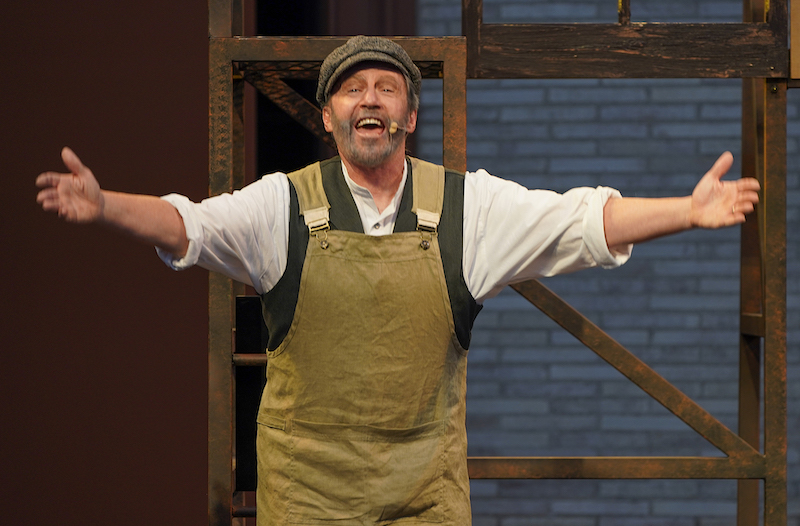Tevye In New York!
Reviewed by Martín Hernández
Dugan’s Backyard Playhouse
Through August 6
RECOMMENDED
Between 1895 and 1914, Sholem Aleichem, the pen name of author Solomon Rabinovich, wrote tales in Yiddish about Tevye, the devout Jewish dairyman, his family, and their travails in their small village in the Ukraine, then part of Imperial Russia. For those who only know Tevye from Fiddler on the Roof, actor/writer Tom Dugan’s adaptation of Aleichem’s stories, on which the Broadway musical is based, is a thoughtful examination of his hardships and those of his offspring. While Aleichem’s stories celebrate the strength of family, Dugan’s one person show mixes some of the original stories with the playwright’s own extrapolations which add another dimension – a rejoicing in the resilience of immigrants who escape exploitation in their home countries only to find another form of it in the U.S.A.
It is the Fourth of July 1914 and Tevye (Dugan) and his twin daughters Bielke and Taybele – who goes by the male name of Abel for reasons Tevye later explains – are living in Manhattan’s Lower East Side and await the arrival of family from the Old Country. While his children and their Italian immigrant friend Maria have gone to fetch the visitors, Tevye has time to kill and what better way for a man who loves to talk – especially to his horse – than to regale us with his sometimes harrowing but mostly humorous experiences.
The comical largesse of a stranger twenty years before is how Tevye explains his transformation from wood cutter to dairy farmer, a change that eased the financial burden of supporting his beloved spouse Golde and their six young daughters. But even a bolstered income cannot save the family from increasingly ferocious pogroms against Russia’s Jews, forcing Tevye and his family to leave for America. On the ship, Taybele protects herself from potentially violent male advances by taking on a masculine persona, a subterfuge she chooses to continue in America but that Tevye finds mildly confusing. In one horrendous revelation, the Triangle Shirtwaist Company Fire of 1911, that killed 146 mostly Jewish and Italian immigrant garment workers due to the company’s negligence, effects Tevye’s family in a profound manner, both for good and bad.
Dugan makes for an affable Tevye under JP Hubbell’s straightforward direction, with Hubbell utilizing common objects, from wooden crates to tables, to aid in Tevye’s reliving his chronicles. Adding to the family feel is the play’s venue, Dugan’s own backyard, where he created a performance space during the Covid epidemic. So far it appears successful and considering the fragility of the current theatre scene this could be one way, even with airliners overhead and barking dogs next door, to keep it afloat, especially since there is a pool back there as well.
Dugan’s Backyard Playhouse, Woodland Hills (address will be given after a reservation is made.) Fri.-Sat., 8 p.m.; Sun., 7 pm; through Aug. 6. dbptickets@gmail.com











